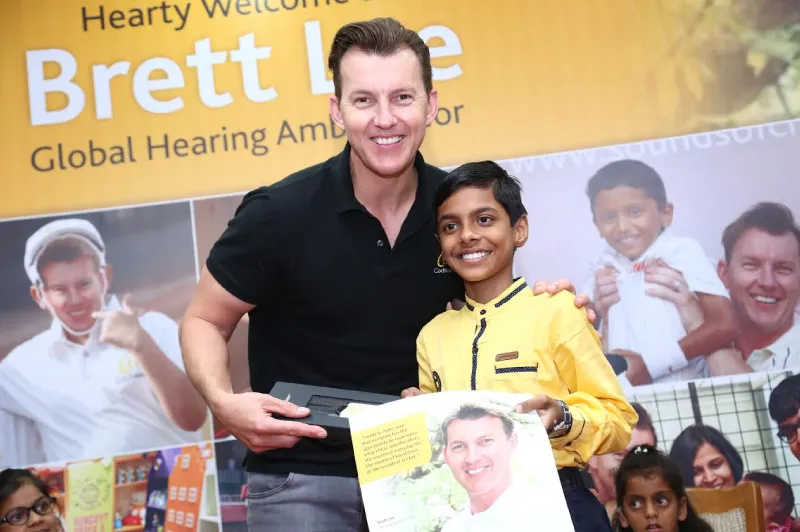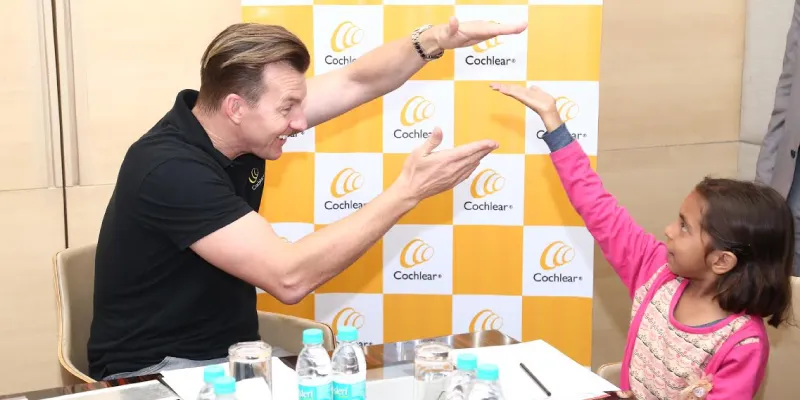No one deserves to live in silence: cricketer Brett Lee tells us why Hearing Matters
Cochlear designs, manufactures and delivers hearing implants and is committed to providing children who suffer hearing loss with the best hearing experience. Former Australian cricketer Brett Lee is Cochlear’s global ambassador.

For World Hearing Day, Cochlear launched Hearing Matters, a campaign to spread awareness about hearing loss in India, especially educating parents about the importance of screening newborns for hearing loss.
A survey by Cochlear India and First Moms Club in New Delhi found that 84.1 percent mothers believe that children should be tested for hearing loss at birth, but only 38.9 percent actually had their child screened.
Mothers are aware of the need to get their children tested for hearing impairment, but do not know what they must do about it. Reports show that five to six out of 1000 newborns are hard of hearing, but they are not identified till irreversible damage has already been done.
Brett Lee, Cochlear’s global ambassador says, “All too often, we take little things for granted such as how much hearing matters. It was a big wake up call for me when my son was diagnosed with hearing loss at the young age of five. We were fortunate enough to restore his hearing, but what about the millions of children who suffer with the condition every day? Early screening for hearing loss can ensure that children are diagnosed and treated early, allowing them to grow up into well-adjusted adults.”
Hearing restored
Cochlear quotes that five percent of the world’s population has disabling hearing loss. Of them, 91 percent are adults and nine percent are children. Fifty percent of hearing loss is preventable through immunising children against diseases like measles, meningitis, rubella and mumps, healthy ear and hearing care habits, and effective treatment of ear infections.

“A cochlear implant is a medical device that mimics the natural hearing function of the inner ear. Unlike hearing aids, which amplify sound, cochlear implants bypass the damaged part of the inner ear and send electrical signals that provide hearing, directly to the hearing nerve."
"Cochlear implants may be a good solution for people with moderate to profound hearing loss in one or both ears who no longer get much or any benefit from hearing aids,” reads the Hearing Matters webpage.
Ananya Nakra received an implant when she was two-and-a-half years old. Over the next 11 years of her life, she has actively participated in dance, arts, and sports in school, and says that she can even sit at the back of her classroom and hear everything!
Nahum Rajkumar’s mother cannot stop gushing about the implant that her son had when he was four years old. “Soon after the implant was switched on, he could hear and imitate high frequency sounds! Even a sound like ‘shhh’ – which is very important when it comes to language,” she says.
Brett Lee’s involvement with the cause
We asked Brett Lee about his passion for correcting hearing loss and his son’s experience with the condition. This is what he has to say.

YourStory: Tell us about your involvement with the Hearing Matters campaign
Brett Lee: I am passionate about raising hearing loss awareness in India. I have been visiting this wonderful country for the last two decades and it is my second home. Through “Hearing Matters,” we aim to bring focus to hearing health and the importance of early intervention. Around 32 million children across the globe suffer some form of hearing loss and India has a big population of this. We want to encourage every parent to get their child’s hearing tested and offer support for parents about potential treatments for hearing loss. This World Hearing Day, I hope we can raise awareness of hearing loss through the “Hearing Matters” campaign to help more children hear what the world has to offer.
YS: What drove you to be Cochlear’s ambassador?
BL: When my son was diagnosed with hearing loss at the young age of 5, it was terribly heartbreaking. We were fortunate enough to restore his hearing, but it made me wonder about all the millions of parents who have children with hearing loss. Through a little reading, I realised that hearing loss when detected early can be well treated and these children can grow up to lead happy, well-adjusted lives just like their hearing peers. But a general lack of public awareness hinders this whole process and affects the child’s development. I urgently wanted to somehow change this scenario and make a difference. Becoming Cochlear’s global hearing ambassador seemed like the perfect opportunity to reach more people with this message of hope.
YS: Can you share your son, Preston’s experience with hearing loss?
BL: When my son Preston was five years old, he had quite a fall and fractured a small part of his skull. As the injury was close to his ear, the impact led to hearing loss in one ear. Fortunately over the next eight months or so, his hearing got back to normal. But, those days just made me realise that no one deserves to live in silence. Hearing matters; we must never ever take that for granted.
YS: What has been your experience interacting with Cochlear implant patients in India?
BL: It has been such a wonderful learning experience to interact with those who’ve received cochlear implants in India. I have travelled extensively across this wonderful country and met hundreds of cochlear implant recipients across cities like Mumbai, New Delhi, Bangalore, Pune, Chandigarh, Kochi, Trivandrum, Kozhikode, and Guwahati over the last few years.
Each story is so powerful in its own way – so many adults and children who struggled with hearing loss now rejoice at the little sounds in life, such as the sound of their families laughing, the birds chirping or the rain beating against their window.
Many have gone on to chase their dreams and it fills me with so much hope. With greater awareness, I’m convinced that we can reach more people, tackle hearing loss on multiple fronts and eventually bring down the numbers, globally and in India.
YS: What steps do you believe India can take to preempt hearing loss in infants and children?
BL: We now have sufficient evidence that shows the earlier hearing loss is detected, better the chances of the child growing up on par with his or her hearing peers. Out of every 1,000 newborns in India, around five to six suffer from varying degrees of hearing loss.
Early screening for hearing loss, particularly at birth is so important and Kerala’s efforts to push for universal newborn hearing screening are a great start! India must now try to make this a nationwide effort.
I have no doubt that it will bring about a positive change in our approach to dealing with hearing loss.
YS: Why do you think hearing loss is such a glaring problem in today’s world?
BL: The reason for this is simple: unlike most medical conditions there are no visible tell-tale signs of hearing loss and so the condition goes ignored for years. Moreover, parents do not seek medical help when their child shows signs of delayed speech. It is no surprise that children are diagnosed with hearing loss well after the critical age (0-3 years) of development and this affects their ability to integrate with society. Adults too do not take good care of their hearing as much as they would care for their sight. I’m hoping that with more discussion and action on the subject, this will change in the coming years.







